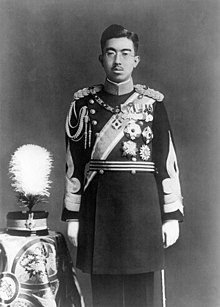 Global Information
Global InformationHirohito information
| |||||||||
|---|---|---|---|---|---|---|---|---|---|
 Formal portrait, 1935 | |||||||||
| Emperor of Japan | |||||||||
| Reign | 25 December 1926 – 7 January 1989 | ||||||||
| Enthronement | 10 November 1928 | ||||||||
| Predecessor | Taishō | ||||||||
| Successor | Akihito | ||||||||
| Regent of Japan | |||||||||
| Regency | 25 November 1921 – 25 December 1926 | ||||||||
| Monarch | Taishō | ||||||||
| Born | Hirohito, Prince Michi (迪宮裕仁親王) 29 April 1901 Tōgū Palace, Aoyama, Tokyo, Empire of Japan | ||||||||
| Died | 7 January 1989 (aged 87) Fukiage Palace, Tokyo, Japan | ||||||||
| Burial | 24 February 1989 Musashi Imperial Graveyard, Hachiōji, Tokyo | ||||||||
| Spouse |
Nagako Kuni (m. 1924) | ||||||||
| Issue |
| ||||||||
| |||||||||
| House | Imperial House of Japan | ||||||||
| Father | Emperor Taishō | ||||||||
| Mother | Sadako Kujō | ||||||||
| Religion | Shinto | ||||||||
| Signature | |||||||||
Hirohito[a] (29 April 1901 – 7 January 1989), posthumously honored as Emperor Shōwa,[b] was the 124th emperor of Japan, reigning from 1926 until his death in 1989. He was one of the longest-reigning monarchs in the world, with his reign of 62 years being the longest of any Japanese emperor.
Hirohito was born at Aoyama Palace in Tokyo, during the reign of his paternal grandfather, Emperor Meiji. He was the first child of the Crown Prince Yoshihito and Princess Sadako (later Emperor Taishō and Empress Teimei). As the grandson of Emperor Meiji, Hirohito was raised away from the court, but returned following his caregiver's death. His education emphasized physical health due to his frailty, alongside values of frugality and devotion to duty. Hirohito's early military commissions and education under influential figures shaped his perspective on Japan's divine imperial lineage, and its role in modernization and diplomacy. His father acceded to the throne in 1912 upon the death of his father Emperor Meiji, making the eleven-year-old Prince Hirohito the heir apparent. Proclaimed crown prince in 1916, Hirohito's overseas visits in 1921 to Western Europe marked a significant step towards international diplomacy for Japan, despite domestic opposition. His experiences abroad, particularly in Britain and meeting with European monarchs, influenced his understanding of international relations and Japan's position on the global stage.
Hirohito assumed regency in 1921 due to his father's health issues, navigating Japan through significant treaties, the 1923 Great Kantō earthquake, and an assassination attempt. In January 1924, he married Princess Nagako Kuni and their marriage further solidified his position within the imperial family and Japanese society. They had seven children: Shigeko, Sachiko, Kazuko, Atsuko, Akihito, Masahito and Takako.
When his father died in December 1926, Hirohito—then 25 years old—became emperor of Japan. Hirohito reigned as a constitutional monarch and was the head of state under the Meiji Constitution during Japanese imperial expansion particularly in China, militarization, and involvement in World War II. During Hirohito's reign, Japan waged a war across Asia in the 1930s and 40s. His involvement in military decisions, particularly in the Second Sino-Japanese War and Pacific Theater of World War II, has been a subject of historical debate regarding his responsibility for war crimes. Despite initial successes, Japan's strategic miscalculations under his reign led to devastating consequences for Japan.
After the surrender of Japan, despite it waging the war in the name of Hirohito, he was not prosecuted for war crimes, for General Douglas MacArthur thought that an ostensibly cooperative emperor would help establish a peaceful Allied occupation and the U.S. achieve its postwar objectives.[1] As a result, MacArthur did everything in his power to exclude any possible evidence that would have incriminated Hirohito and his family during the Tokyo War Crimes Tribunal. On 1 January 1946, under pressure from the Allies, the Emperor formally renounced his divinity. Hirohito played a crucial role in recovery of postwar Japan and reintegration into the international community, though his wartime role remained controversial. His legacy is a complex blend of tradition, militarism, and modernization, reflecting the challenges and transformations Japan faced during the 20th century. Hirohito died aged 87 at Fukiage Palace in January 1989, and was succeeded by his eldest son, Akihito. By 1979, Hirohito was the only remaining monarch in the world with the title "Emperor", after Jean-Bédel Bokassa, Emperor of Central Africa was deposed.
Cite error: There are <ref group=lower-alpha> tags or {{efn}} templates on this page, but the references will not show without a {{reflist|group=lower-alpha}} template or {{notelist}} template (see the help page).
- ^ Rich 2018.